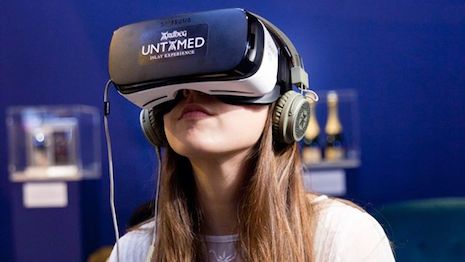Marketers are swimming in data but lack the right questions
MUSCAT, Oman – As technology becomes more pervasive and essentially consumers’ entire worlds are becoming computers, there is endless data at luxury marketers’ fingertips, but it is how they use it that will matter.
During the session “Mindful Luxury and the Future” at Condé Nast International’s Luxury Conference on April 5, a futurist emphasized that eventually marketers will be able to tell everything they ever wanted to know about consumers, if they are not able to already. The real value lies within how these retailers and marketers put all this data to use, rather than the data itself.

Virtual reality at LVMH’s Luxury Lab during Viva Technology in 2016
“I think that our behavior will all be categorized all the time – where we shop, where we live, where we stay, how brief,” said Sophie Hackford, Futurist. “Everything will be completely observed and categorized by AI.
“So the question becomes what would you do if you had all the data of the world, because basically that is what is going to happen,” she said. “We will have information or answers will come cheat, questions are what becomes valuable.
“We are swimming in data but we do not have the right questions.”
Future of retail
In the near future, companies will be able to ascertain almost everything about a consumer’s life through technology and satellite CCTV. Retailers and marketers will be able to know everything about what a customer does, where they live and shop, for how long and so much more.
While the concept of this does borderline an idea of ethics, the truth is this technology will be reality pushed by major tech companies such as Google and Uber.
Currently, the space is more or less unregulated, as the technology is moving faster than the law can.
However, consumers are becoming more comfortable with sharing their data with companies and marketers will need to know how to discern the data.
As data collection technologies progress, retailers are finding more reason to expand their analytics abilities, something in which luxury retailers can benefit.
According to a report from Boston Retail Partners, 44 percent of retailers think that analytics is a major priority in the future. Additionally, more than 82 percent identified the need to improve their planning systems to act on data analytics as something that they need to focus on in the future (see more).
VR future
Virtual reality is another important piece of technology that retailers should learn to incorporate into their retail strategy. While the technology may be new right now, it is becoming closer to mainstream use, which means retailers could soon be behind if they do not keep up.
Similar to how many retailers were skeptical to take on any ecommerce solution, retailers who are dubious of VR could find themselves far behind the industry standard in the near future.
Facial recognition, AI and emotion could very well control in the future purchasing capability. Instead of using your hands to type or control a mouse or touchscreen, the future keyboard could be emotion.
These artificial intelligence solutions will be able to monitor body language to decipher intent. Consumers could be buying products in the future by simply emoting.
Major leaps forward in retail are already being had, and will continue to dramatically shift the industry.
For instance, the future of loyalty is mobile and card free. The explosive growth of mobile applications has provided an obvious avenue for consumers to reduce the number of loyalty cards they carry.
While some consumers will always prefer plastic cards in their wallet, the way ahead is primarily seen as digital (see more).
“In an environment that is being mediated by technology, the boundary between us and a company or us and a government is getting pretty blurry,” Ms. Hackford said. “As always, technology is miles ahead of regulation.
“There will be a law lag to catch up to technology, so it is a bit of the Wild West out there.”
Source: www.luxurysociety.com



